'We are heading toward a collision course by the end of the year': Iran will be capable of making a nuclear weapon in two months, warns Israeli intelligence official
Officials believe Tehran is pressing ahead with enriching sufficient uranium to make a weapon

Your support helps us to tell the story
From reproductive rights to climate change to Big Tech, The Independent is on the ground when the story is developing. Whether it's investigating the financials of Elon Musk's pro-Trump PAC or producing our latest documentary, 'The A Word', which shines a light on the American women fighting for reproductive rights, we know how important it is to parse out the facts from the messaging.
At such a critical moment in US history, we need reporters on the ground. Your donation allows us to keep sending journalists to speak to both sides of the story.
The Independent is trusted by Americans across the entire political spectrum. And unlike many other quality news outlets, we choose not to lock Americans out of our reporting and analysis with paywalls. We believe quality journalism should be available to everyone, paid for by those who can afford it.
Your support makes all the difference.A senior Israeli intelligence official has warned that the Jewish state has just two months “to sleep soundly” before Iran is capable of making a nuclear weapon and that the two countries are heading towards aggression before the end of the year.
Speaking at Tel Aviv University’s Institute for National Security Studies, Amos Yadlin, a former head of Israeli military intelligence, said that Iranian scientists are close to crossing the ‘red line’ that was outlined by Israeli Prime Minister Benjamin Netanyahu outlined in a speech at the United Nations last September. During that speech, Mr Netanyahu drew a line with a red pen on a picture of a cartoon-like bomb, at which point he said that Iran would be 90 per cent ready to produce a bomb.
Mr Yadlin’s warning comes just a day after Israel and the United States agreed a $10 billion (£6.5 billion) arms deal that will see cutting edge American technology sold to the Israeli army. Mr Yadlin’s comments publicly affirm the opinion of many Israeli officials, who in private argue that talks aimed persuaded Tehran to give up its ambition nuclear weapons are wasted time, and that Iran is pressing ahead with enriching sufficient uranium to make a weapon.
Israeli officials believe that rather than seven-year old talks between the UN Security Council’s five permanent members, and Germany (known as the P5+1), and Iranian officials, which are approaching their 10th round, are set to fail and that, in the words of Mr Yadlin, “we are heading toward a collision course by the end of the year”.
Rather, Israel believes that only the outcome of Iran’s presidential elections, set to be held in two months’ time, will determine whether Iran decides to take the final steps towards making the bomb. Tehran insists that its nuclear ambitions are for purely for peaceful means.
Israel would rather the Americans, or better still a multi-lateral force, carried out any military action, but according to Mr Yadlin, “Israel will, in fact, be the first to have to reach a decision. It is not party to the negotiations. At the Iranians’ current rate of production, even to those who today are saying they won’t cross the red line – there is no doubt that by the summer they will cross it.”
The comments come after the first visit to Israel by Chuck Hagel, the new US defence secretary. Despite the increased bellicosity in Israel, the P5+1 and unilaterally, the Americans, have constantly favoured a negotiated settlement. Having only recently extracted itself from a decade-long commitment in Iraq, Washington is loth to involve itself in another Middle Eastern military adventure.
However, the Americans and other countries have insisted military action remains a possibility. While John Kerry, the US Secretary of State, has said he does not believe Tehran’s assertions over its nuclear programme, he is reluctant to impose fresh sanctions and believes negotiations ought to be given more time to produce results.
Join our commenting forum
Join thought-provoking conversations, follow other Independent readers and see their replies
Comments